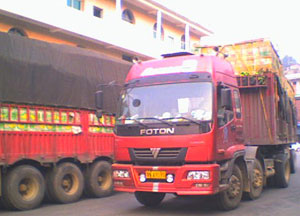Burmese military authorities closed the main trading point with China in Kachin State, northern Burma, March 30th, leading to higher commodity prices in the country, according to traders.
 The check point at Laja Yang village, close to the Kachin Independence Organization (KIO) headquarters in Laiza, was closed by the Military Affairs Security (MAS), under the northern regional command, as well as police, preventing exports from China entering northern Burma. However, non-trade related travel is allowed through the gate, a trader said.
The check point at Laja Yang village, close to the Kachin Independence Organization (KIO) headquarters in Laiza, was closed by the Military Affairs Security (MAS), under the northern regional command, as well as police, preventing exports from China entering northern Burma. However, non-trade related travel is allowed through the gate, a trader said.
“The price of cement jumped from 6,900 kyats (US$6) to 7,500 kyats (US$8.7) and the price of other commodities, such as housing materials and basic food, is going up,” he said.
The main exports from China coming through the check point every day include basic foods, such as eggs, garlic and fruit, as well as beer, housing kits, machine parts, textiles, clothes and kitchen kits.
These commodities are becoming scarce in Kachin state since the check point closed.
The Burmese military are inspecting vehicles and demanding more money at the check points, which is also contributing to the increase in commodities prices, traders said.
Authorities are also seizing all Chinese exports to Myitkyina, the capital of Kachin State, from a warehouse in Nam San Yang village, between Laiza and Waingmaw Township.
“The junta is not sitting on only one check point but is going around everywhere doing inspections and seizing goods,” the trader said.
Exports to China, such as cucumbers, bananas, corn, rubber and rice are still being allowed.
Although the Burmese military closed Laiza and the Laja Yang Gate to Chinese imports, it still allows them through at Kambaiti, the entrance to the area under control of the former New Democratic Army-Kachin (NDA-K), which transformed into the junta controlled Border Guard Force in 2009.



